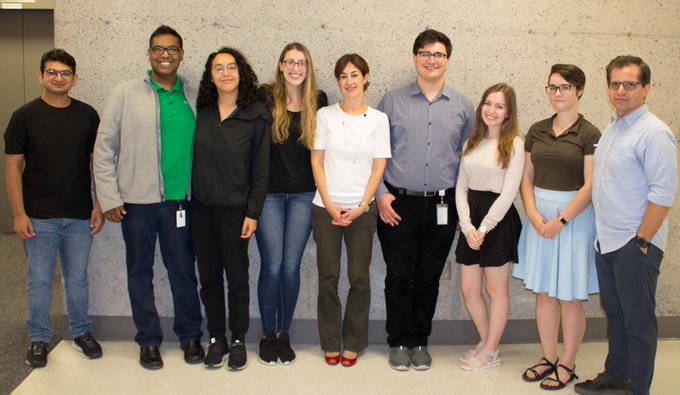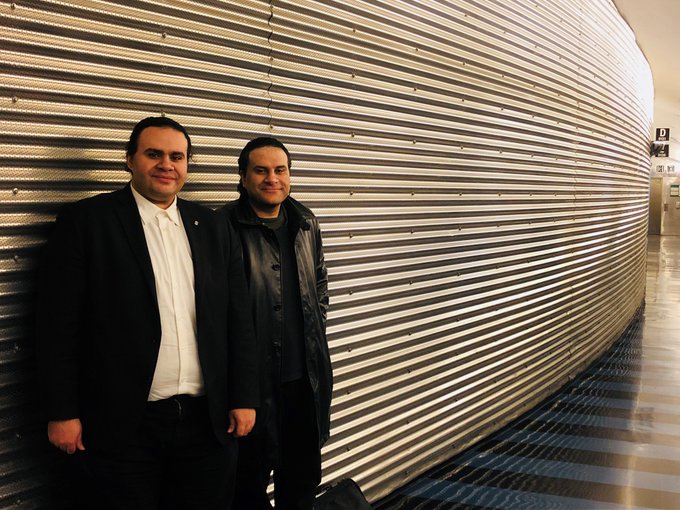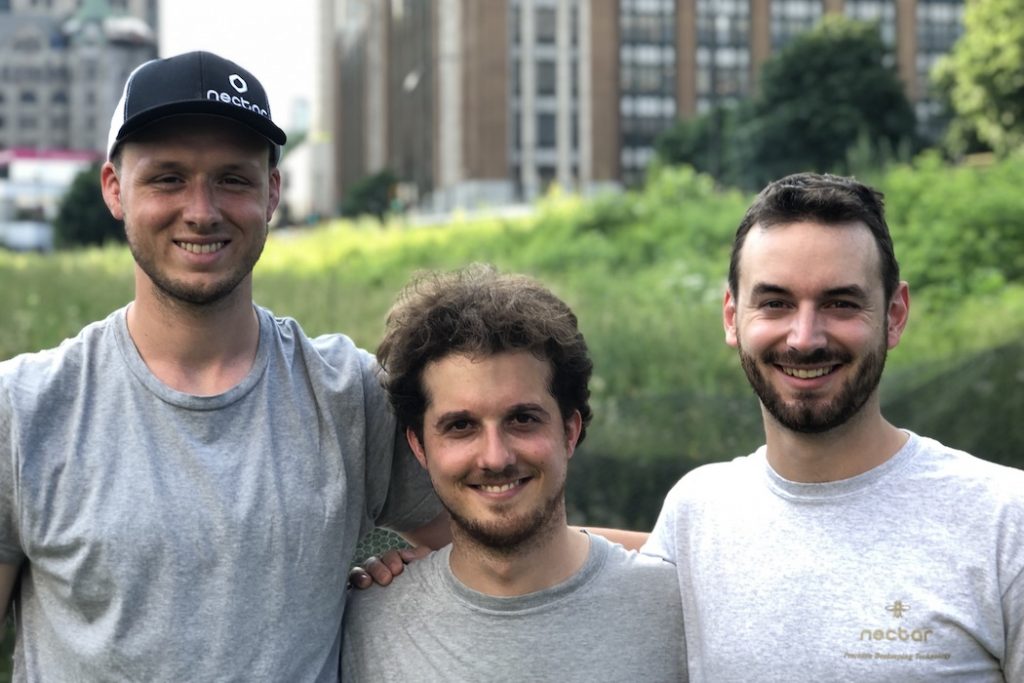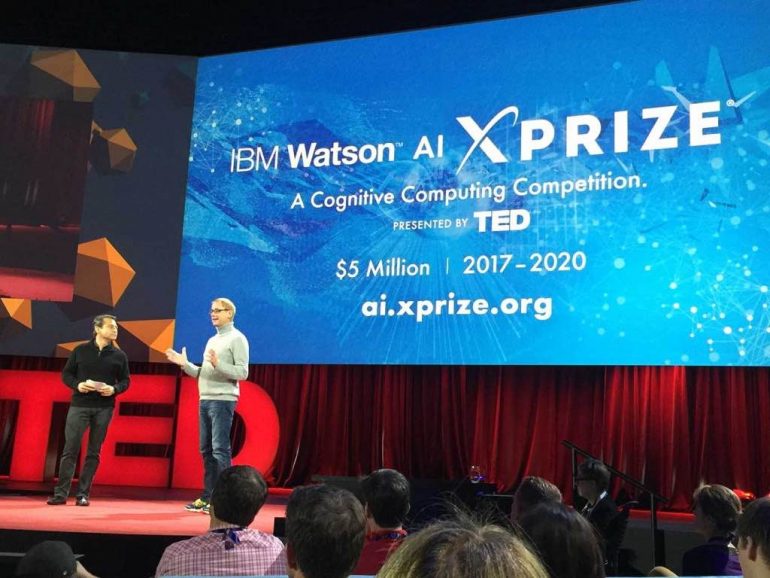At the beginning of December, the global IBM Watson AI XPrize will announce its top 10 semi-finalists before heading into its fourth and final year. The competition, which kicked off in June 2016, invited teams from around the globe to create artificial intelligence applications to tackle the “world’s greatest challenges.” The winning team will receive $5 million.
AI XPrize is a four-year prize with three judging rounds where contestants are ranked each time. There are also milestone awards once a year where the top 10 teams are invited to present live, with the winner getting additional funding. Once the top 10 semi-finalists are announced in December, IBM will narrow down the top three in February, with the winner set to be announced in April.
Five out of the current 32 semi-finalists are Canadian startups. BetaKit spoke to each of them about their work, vision of AI for good, and what being an AI XPrize finalist means to them.
Aifred Health
People living with depression and other mental health issues can spend months or even years trying to find the right treatment to put them in remission. Montreal-based Aifred Health wants to change that.
“Many members of our team have lived experience, either themselves or with family who’ve struggled with mental health.”
Aifred, currently ranked as XPrize’s top competitor, was originally founded by McGill University graduates Robert Fratila, David Benrimoh, Sonia Israel, and Kelly Perlman. Marc Miresco, a psychiatrist with experience in the digital health industry, joined within the first year, and the company recently got a new CEO, Marina Massingham, who co-founded TeoOra Health.
The company has built an app that gives clinicians access to more data on their patients’ mental health by asking patients a series of standardized questionnaires every week. Aifred then uses artificial intelligence to help clinicians determine the best method of treatment. Aifred, which just raised a pre-seed round of $490,000 in late August, is in the process of trialling its software with clinicians, and is ramping up to its second trial, which will give the company its first opportunity to work directly with real patients.
“[Our AI] learns a model of differential treatment and response; so how can we predict remission to treatment in general, and can we use that to predict a response to individual treatments,” said Benrimoh, Aifred’s chief science officer.

Now, Aifred is working on creating an ability to look at an individual patient’s trajectory and build a care plan based on that. The model is currently in trials, and reportedly able to differentiate seven common treatments for depression.
For many of Aifred’s team members, the challenge was personal. “Many members of our team have lived experience, either themselves or with family who’ve struggled with mental health problems and depression specifically,” Benrimoh said. “I am a psychiatry resident, this is literally my daily job. I see the state of clinical practice and we all know something has gotta give.”
To have made it as far as the XPize finals, Benrimoh said, is surreal. “It’s really rewarding to know that the team has put in all this work and we are where we are.”
AITera
Quebec City-based AITera wants its app to improve the remediation prospects for contaminated sites — or in the words of the company’s president, Daniel Fortin, to cure “earth cancer.”
AITera has built an algorithm that can tell a government body or engineering firm what remediation method would be the most effective for the site it is working on. Fortin said the technology is a clear example of the XPrize’s “AI for good” mandate, because it could not only improve the success of remediation efforts and help to return sites to their natural state, but also lower the environmental impact of the remediation work itself, by reducing engineers’ trial-and-error work. It also has implications for private industry, he said.
“Anybody that needs to be a good corporate citizen needs to clean up their site.”
“Anybody that needs to be a good corporate citizen needs to clean up their site, but more importantly if you want to build something on a contaminated site you need to clean it first,” he said. “So there’s an economic dimension to the application.”
The company’s algorithm analyzes all public data from governments and engineering firms about the remediation of contaminated sites, such as former industrial sites with heavy metal contamination, closed-up gas stations, as well as mine and oil sands. That data includes more than 40 factors, such as the level of contamination, groundwater speed, and soil type. Fortin said AITera has learned from more than 50 years of existing data to be able to make its suggestions.
Being part of the competition has been meaningful for AITera, Fortin said. “It gives a sense to the team that they’re working for something good.”
Learn Leap Fly
It’s an impressive feat to land a spot in one of the highly competitive XPrizes. But Learn Leap Fly, an Ottawa-based startup founded by married mathematicians Amy and Kjell Wooding, has managed it twice. The company created a tablet app that uses machine learning to teach children reading, writing, and basic math skills.
Amy and Kjell previously competed in the three-year Global Learning XPrize and went on to rank in the top 11 semifinalists. After receiving an email from the XPrize Foundation suggesting the company be a good fit for the AI Xprize, they applied and got in.
Learn Leap Fly’s app uses story-based learning to educate children, starting by reading a story to them, then allowing them to take over and read on their own. Each of the learning activities children are asked to complete are based around the story they are reading. A story about a young child who ate too much fruit, for example, might see counting games about the number of pieces of fruit and exercises that teach them the meaning of a word, which is later put in context within the story.
RELATED: HiMama raises $7.25 million CAD Series A to expand child care software
The app uses machine learning to understand the preferences of the children using it, for example, whether they need extra time learning numeracy skills, or knowing when they become less engaged with their task. It also understands that certain activities will require more or less time to complete.
Machine learning also comes into play in an interesting way when the tablets are being used in a classroom setting. “Each tablet has its own personality, its own inherent preferences,” Kjell said. “Some are more likely to show numbers games or stories. That meant children could self-select and move around to find the things that appeal to them. That self-selection helped them with their engagement level.”
While Kjell and Amy have trialed the app in classrooms, they think it could have the most impact at home, specifically for children who are not having an easy time learning in a classroom setting.
UOttawa AI/Mindeavour
What if visually impaired people could navigate their city without relying on humans, guide dogs, or other aids. That’s something Ottawa-based UOttawa AI is looking to solve for.
UOttawa AI, also known as Mindeavour, is comprised of University of Ottawa graduate students, and brothers, Ahmed and Mahmoud Orabi and their professors, Timothy Lethbridge, a software engineering expert, and Diana Inkpen, the director of the Natural Language Processing Lab.
The group created a smartphone app that uses machine learning to identify the streetscape around the user and inform them of what’s coming – such as a swerving car or bicycle, a pothole in the sidewalk, or when it’s safe to cross an intersection — through audio and beep or vibration alerts. Users can move the phone side to side to let the app view more of the scene, and ask it questions about what it sees around them. The app works on phones without the need for an Internet connection.

“We wanted to have a system that would understand and assist people to improve their quality of life and maintain their privacy,” said Ahmed. “It would enable them to take control of their lives and better integrate into our society.”
Ahmed was doing his PhD in computer vision, supervised by Lethbridge, and working on a project that used computer vision to identify when people became frustrated using a software Lethbridge had created. When they heard of the AI XPrize, they thought they could use Ahmed’s knowledge and expertise for a new application.
Lethbridge explained that the group trained their algorithm on large amounts of video frames, with people orally annotating what’s being shown on the screen. The group is getting ready to trial the app with visually impaired people in a lab setting in the fall, with hopes to eventually do tests outdoors.
Nectar Technologies
Beekeeping isn’t the most obvious industry that could benefit from AI, but Montreal-based Nectar Technologies thinks its beehive health tracking application could have major benefits for commercial beekeepers – and for global food security.
“In addition to beekeepers, we can make an impact on the larger food chain.”
– Co-founder and CSO, Evan Henry
The company, founded in 2016 by Marc-André Roberge, Xavier de Briey, and Evan Henry, created sensors that measure a beehive’s temperature, relative humidity, sound, and movement and an AI system that uses that data to give beekeepers insights that will help them keep their bees healthy and productive. Commercial beekeepers can see all that data through an online interface.
“One problem commercial beekeepers face was the health of each hive on an individual level,” said Henry. “Commercial beekeepers typically manage 1,000 hives, or more, in groups of 30 to 50 beehives per yard or area, so they are a little bit of a traveling salesman.”
He noted that Nectar can help prevent beekeepers from travelling far distances to care for hives, by giving them up to date data.
Both Henry and Roberge bring their own beekeeping experience and enthusiasm to bear in their work. Roberge was previously a beekeeper, and Henry was the president of McGill University’s beekeeping association during his undergrad and built in-hive sensors as part of his master’s degree in bioresource engineering.

“I found [beekeeping] was a very interesting piece in food security and food production,” Henry said. “I was happy to have that evolve into Nectar and applying technology to the industry that has been very underserved by technology.”
Nectar also received the $5,000 people’s choice award at an early December milestone competition during the 32nd annual Conference on Neural Information Processing Systems (NeurIPS) in Montreal. Outside of the XPrize, the company has already generated a lot of buzz, recently closing a $1.1 million CAD seed round.
“In addition to beekeepers, we can make an impact on the larger food chain, or a different element of the food supply chain, from the growers who are interested in the data as well,” Henry said.


